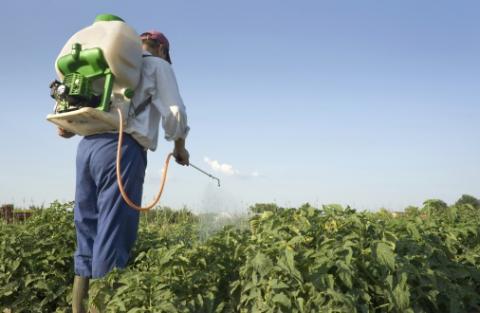Do You Need A Pesticide Applicator License?

Do you need a license?
In New Hampshire, you can become certified as a Private Applicator, Commercial Applicator, or Pesticide Dealer, depending on how and where you intend to use pesticides.
What type of license do you need (private vs commercial; general-use vs restricted-use; pesticide dealer)?
Private Applicator
A Private Applicator is someone who purchases and/or uses (or supervises the use of) a Restricted-Use pesticide on their own property or someone else’s property for the purpose of producing an agricultural commodity, as long as they do not receive direct compensation for their services.
Types of Private Applicator Permits:
Private Applicator Restricted-Use Permit
- Required when only General-Use pesticides (those sold over the counter to anyone) are used.
- No exam is required.
- You must submit an annual use report.
- This permit is only valid if no workers are employed in the production of the crops.
Private Applicator Restricted-Use Permit
- Required if you employ workers involved in crop production, regardless of whether General-Use or Restricted-Use products are applied.
- Subject to Federal Worker Protection Standards.
- You must pass an exam, provide worker training, and submit an annual use report.
See Private Pesticide Applicator Licensing (Permitting) for more information.
Commercial Applicator "For Hire"
A Commercial Applicator for hire is any individual who applies pesticides on another person’s property for compensation or as a service, regardless of whether they are paid or whether the pesticide is General-Use or Restricted-Use.
-
Includes individuals working for a government agency (e.g., townships, schools, parks) or on other public sites.
-
Applies to use of all pesticide types, including over-the-counter products.
See Commercial Applicator Licensing (For Hire) for more information.
Supervisory Registration Certificate – General Use
This certificate is issued to commercial applicators for hire who apply General-Use pesticides under the following categories: B, C1, F2, F8, G1, and G2.
Holders are responsible for deciding:
- How they are applied, and
- What precautions must be taken.
-
Whether pesticides should be used,
See Supervisory Registration Certificate-General Use for more information.
Commercial Applicator "Not for Hire"
A Commercial Applicator not for hire applies pesticides on:
- Their own property,
- Their employer’s property, or
- In the course of government duties (e.g., federal, state, municipal).
This includes roles such as golf course staff and municipal employees.
See Commercial Applicator Licensing (Not for Hire) for more information.
Pesticide Dealer
A Pesticide Dealer is any individual or business that distributes, sells, offers for sale, or holds for sale Restricted-Use or Prohibited Limited-Use pesticides.
Not Sure What You Need?
If you're uncertain about which license or permit is required for your situation, contact the:
New Hampshire Department of Agriculture, Markets & Food
Division of Pesticide Control
Phone: 603-271-3694
